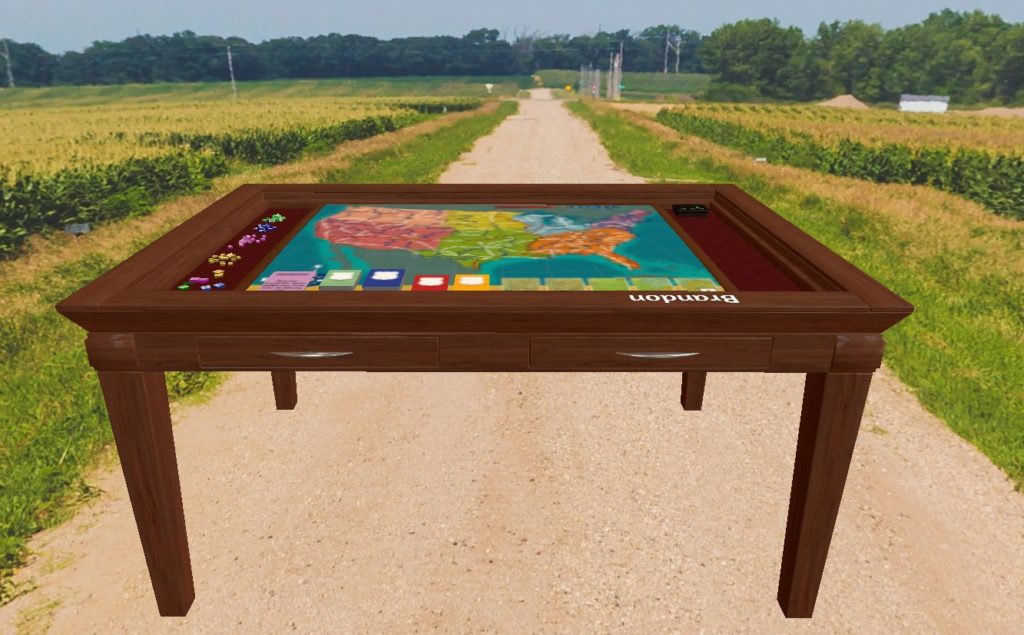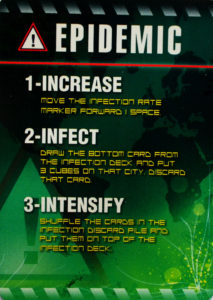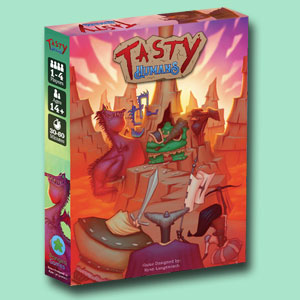Dev Diary posts are made to teach game development through specific examples from my latest project: Highways & Byways.
Just here for Highways & Byways updates? Click here – it will take you right to the updates at the bottom of the page.
I have play-testing on the brain. In the wee hours of the morning last Friday night, James Masino delivered the first serious draft of Highways & Byways board art. It was a gorgeous rendition of the disorganized mess of roads and states that I’d been play-testing with before. By using color/contrast zones, stripping all text from the board, and generally making the game look pretty, I was finally able to coordinate play-tests through Tabletop Simulator.

Need help on your board game?
Looking for more resources to help you on your board game design journey?
The main challenge of Highways & Byways at this point is not the core engine, the mechanics, or the rules, but rather how well the game itself can communicate with players. James and I are both informal students of behavioral psychology, so we’re always looking for the best possible ways to get our points across.
During the course of these play-tests online, I was able to watch players learn the game for the first time. After a few minutes, patterns of behavior emerged and I noticed subtle behaviors that provide information on how the game is being perceived by the players. I’ve listed seven behaviors I’ve been watching for. This isn’t an exhaustive list, but rather just a short list of lessons I’ve learned this week.
7 Subtle Player Behaviors You Should Notice When Play-Testing
1. Players spend a long time searching for something on the board.
If players spend a disproportionately long amount of time searching for something on the board or on cards, that means your game doesn’t communicate clearly. Ask your play-testers where they are getting stuck and take notes. You might need to work with your artist to find a clearer way to communicate important rules.
2. Players forget to do something on a regular basis.
If players forget to do something on a regular basis, there are two ways you can deal with the problem. The first is that you can simplify your game to where players have fewer actions that they must do. The second is that you can list everything on a reference card, telling them what to do and when to do it.

3. When confronted with certain gameplay situations, players ask questions or check the rule book.
Sometimes this is unavoidable, especially in more complicated games. However, if you find players doing this so much that it slows down the pace of the game, you need to simplify the mechanics, create a reference card, or clarify the structure of your rule book.
4. Players spend a long time using components.
Having physically accessible components is important, even for players who don’t have any physical issues. My hands work perfectly fine, but I am loath to deal with paper money in games, shuffle decks over and over again, or move 100 tiny little punch-out pieces on a board. It gets old fast.
As this is a surprisingly complicated thing to get right, here are some articles which you might find useful if your game has problems with annoying components.
- The Art of the Paper Test: Catching Accessibility Issues Early (Dev Diary: 05/19/17)
- Why does accessibility in board games matter? (A Guest Post by Michael Heron of Meeple Like Us)
- What is the role of accessibility in the board game community?
5. Players make decisions to help themselves or hurt other players.
Unlike the four behaviors above, if you see players overwhelmingly choosing to harm competitors or keep to themselves, that does not necessarily indicate a problem. In fact, unless what you find players doing completely clashes with your intentions when creating the game, any outcome is good! If a game is very “take that” or mean-spirited, then when it’s time to sell it, you pitch it to an audience who enjoys that sort of thing (like I did with War Co.) If players find that their best strategy is to take care of themselves, then that is fine, too. That’s how it goes with Highways & Byways about 70-80% of the time, so you can imagine I’ll be capturing the attention of different players than I did with War Co.
6. Players engage in table talk (or not).
The presence or absence of table talk is a good indicator of game weight. If you see players engaging in table talk, that means your game is fairly light. If players tend to go silent for long stretches of time, your game is probably heavy. People don’t tend to socialize and make strategic decisions at the same time. Your game can be lightweight or heavyweight – both are fine! Understand that different players like games of different weights.
7. Players freeze.
If players freeze, that is because they are not sure what to do. Sometimes your rules aren’t very clear, but sometimes your players are experiencing analysis paralysis. If it’s the former, you need to clean up your rules. If it’s the latter, your game may have too many decisions. You can either pare them down or accept that your game is heavyweight. Either option can be fine, depending on what direction you plan on taking the game in. Highways & Byways does not have this issue, but War Co. does suffer from it, simply because of the sheer number of options available to players.
Most Important Highways & Byways Updates
- James Masino delivered board art.
- I created test version Highway 4 in Tabletop Simulator.
- Through my Discord community, I did some play-testing of version Highway 4 in Tabletop Simulator.
- After a few play-tests, I changed up the “Event Card” mechanic by doing some tweaks.
- The above changes were significant enough for me to create test version Highway 5.
- James polished up the board a little.
- I created test version Highway 5 in Tabletop Simulator.
- I plan on play-testing Highway 5 this weekend through the Discord community.
- The entire time this has been going on, I’ve been focusing on growing the newsletter and Discord community with a mix of manual outreach and Facebook ads.





One thought on “7 Subtle Player Behaviors You Should Notice When Play-Testing”